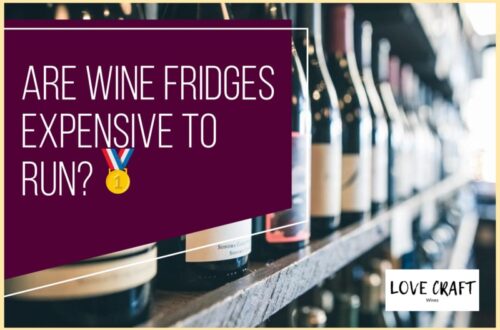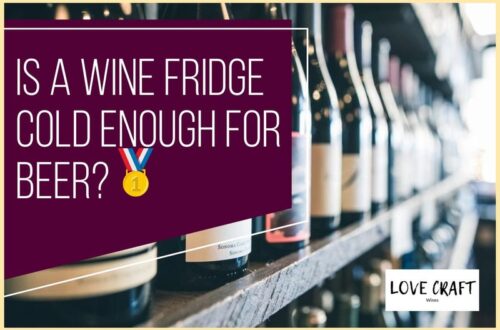Have you ever opened a bottle of wine, only to find it has been left in the freezer for too long and turned into a slushy mess? It’s a frustrating feeling, especially when you were looking forward to enjoying a nice glass of vino.
But have you ever wondered at what temperature wine actually freezes?
There are several factors that can affect the freezing point of wine, including the alcohol content, sugar content, and acidity. Understanding these factors can help you prevent your wine from freezing and ensure that it remains at its optimal taste and quality.
So, let’s delve into the science behind wine freezing and explore what happens when it does.
Table of Contents
Factors Affecting the Freezing Point of Wine
It’s all about what’s in your bottle that determines whether your vino turns to ice or not. The freezing point of wine, like any other liquid, is influenced by several factors.
One factor is the effect of impurities. Unlike pure water, wine is a complex mixture of various chemicals, such as sugar, acids, tannins, and alcohol. These impurities lower the freezing point of wine, making it less susceptible to freezing than pure water.
Another factor is the effect of pressure on the freezing point of wine. According to the laws of thermodynamics, the freezing point of a liquid decreases as the pressure increases. Therefore, if you freeze wine in a closed bottle, the pressure inside will increase, and the freezing point will decrease. This is why wine stored in a bottle is less likely to freeze than wine poured into a flat container.
But, as we will see in the next section, the alcohol content of wine plays a crucial role in determining its freezing point.
Alcohol Content and Freezing Point
You may have noticed that the higher the alcohol content in your favorite beverage, the lower the freezing point, meaning that the more alcohol you have in your drink, the less likely it is to turn to ice.
This is due to the fact that alcohol, specifically ethanol, has a lower cryoscopic constant than water. The cryoscopic constant is a measure of how much a solute (in this case, alcohol) affects the freezing point of a solvent (water). The lower the cryoscopic constant, the less the solute affects the freezing point.
Here are a few key factors that affect the relationship between alcohol content and freezing point:
-
Ethanol concentration: The higher the concentration of ethanol in the wine, the lower the freezing point.
-
Type of wine: Different types of wine can have varying alcohol content, affecting the freezing point differently.
-
Temperature: The lower the temperature, the more likely the wine is to freeze, even with a higher alcohol content.
-
Pressure: High pressure can also affect the freezing point of wine.
Sugar Content and Freezing Point
If you’re a fan of sweet wine, you’ll be interested to know that the sugar content can also affect the freezing point.
Sweetness impact on wine’s freezing point is due to the phenomenon of freezing point depression, which means that the more sugar a wine has, the lower its freezing point will be. This is because sugar molecules lower the freezing point of water by getting in between the water molecules and preventing them from forming a solid structure.
The amount of sugar in wine can vary greatly depending on the type of wine, region, and winemaking process. Generally, sweeter wines like dessert wines and late harvest wines have a higher sugar content and therefore a lower freezing point. However, even a small amount of residual sugar can make a difference in the freezing point of wine.
So, if you plan on storing your sweet wine in a cold environment, make sure to keep an eye on the temperature to avoid any unwanted freezing.
Next, let’s take a look at how acidity can also play a role in the freezing point of wine.
Acidity and Freezing Point
When it comes to the freezing point of wine, acidity levels can have an impact. The pH level and freezing point of wine are inversely related, meaning that the more acidic the wine, the lower its freezing point.
This is because the acidity of wine affects the size of its water molecules, making them smaller and less likely to freeze at the same temperature as larger, less acidic water molecules. Additionally, higher acidity can create a sharper, more vibrant taste that cuts through the palate like a knife. This is why many wine enthusiasts prefer wines with higher acidity levels.
If you’re wondering how acidity levels can change over time, it’s worth noting that the effects of aging on freezing point are minimal. While some wine compounds can break down and become less acidic over time, the changes are typically small enough that they won’t have a significant impact on the wine’s freezing point.
However, it’s worth keeping in mind that the freezing point of wine can still vary depending on the specific wine in question, as well as the temperature and humidity of the environment it’s stored in. With that said, let’s explore what happens when wine freezes.
What Happens When Wine Freezes?
Have you ever left a bottle of your favorite vintage in the freezer for a little too long and wondered what would happen next?
Well, if you did, you would have noticed that the wine inside would turn into a slushy mixture.
As the water in the wine freezes, it expands and causes the cork to pop out. This can lead to potential damage to the bottle or cork, which can affect the taste and texture of the wine after freezing.
If you’re lucky, the wine might still be drinkable after it thaws out. However, the freezing process can alter the wine’s chemical composition, leading to a change in taste and texture.
The alcohol content of the wine may also be affected, making it taste weaker than before. The tannins in red wine can become harsher, while the acidity in white wine can become more pronounced.
In short, it’s best to avoid freezing wine if you want to enjoy its full flavor and aroma.
Frequently Asked Questions
How long does it take for wine to freeze?
Imagine the anticipation of waiting for your favorite bottle of wine to reach the perfect temperature for sipping. But what happens when you forget to put it in the fridge and need it chilled quickly?
You may be tempted to toss it in the freezer, but be cautious. The freezing point of wine can vary depending on its ethanol concentration, which typically ranges from 8-14%.
In general, wine will begin to freeze at around 20°F (-6°C), but the exact temperature can vary. It’s important not to leave it in the freezer for too long, as the expansion of the liquid as it freezes can cause the bottle to burst.
So, while freezing wine may seem like a quick solution, it’s important to handle it with care to avoid ruining your favorite bottle.
Can you still drink wine after it has been frozen?
If you’ve accidentally left your wine in the freezer for too long, you may be wondering if it’s still safe to drink. The freezing process can cause the wine to expand, potentially breaking the bottle or cork. It can also alter the wine’s chemical composition, affecting its flavor and aroma.
While freezing wine won’t make it harmful to consume, it will have an impact on the quality and taste. To prevent the wine from freezing in the first place, store it in a cool, dark place, away from extreme temperatures. If you do need to chill your wine quickly, use a wine chiller or ice bucket instead of the freezer.
Will the taste of wine change after it has been frozen?
Did you know that freezing wine can have a significant impact on its quality and taste?
When wine is frozen, the water in the wine will separate from the alcohol and other components, leading to a change in the texture and flavor of the wine.
The chemical reactions that occur during freezing can also affect the wine’s aroma and color.
The longer the wine is frozen, the more noticeable these effects on quality and chemical reactions will be.
So, if you’re thinking about freezing your wine, be prepared for a potentially different drinking experience.
Can you use frozen wine for cooking or baking?
Using frozen wine for culinary applications can be both beneficial and limiting. The science behind wine freezing and thawing is important to understand in order to fully utilize this technique.
When wine is frozen, the water content expands, which can affect the taste and texture. However, the alcohol content remains the same, making it a useful ingredient for cooking or baking.
When using frozen wine, it’s important to take into account its flavor profile and how it will interact with other ingredients. Overall, while frozen wine may not be suitable for all culinary applications, it can still be a useful tool for adding depth and complexity to your dishes.
Is it safe to store wine in the freezer?
If you’re looking for a way to preserve your wine for longer, it’s important to understand the freezing point of alcohol.
While it may seem like a good idea to store wine in the freezer to preserve it, doing so can actually be detrimental to the quality of the wine.
The alcohol in wine has a lower freezing point than water, which means that when wine is frozen, the water in the wine will freeze first and expand, potentially causing the bottle to crack or break.
Additionally, freezing can alter the flavor and texture of the wine.
To properly preserve your wine, it’s best to store it in a cool, dark place with a consistent temperature and humidity level.
Conclusion
So, now you know at what temperature wine freezes!
Remember that the freezing point of wine depends on various factors like alcohol content, sugar content, and acidity. Wines with higher alcohol content have a lower freezing point, whereas wines with higher sugar content have a higher freezing point. Similarly, wines with higher acidity have a lower freezing point. Understanding these factors can help you store and serve wine correctly.
It’s essential to know what happens when wine freezes, as it can affect the quality of the wine. When wine freezes, the water in it turns into ice, and the other components like alcohol and sugars become concentrated. This can affect the flavor and texture of the wine.
Therefore, it’s best to prevent wine from freezing by storing it at the correct temperature. Remember, prevention is better than cure!





